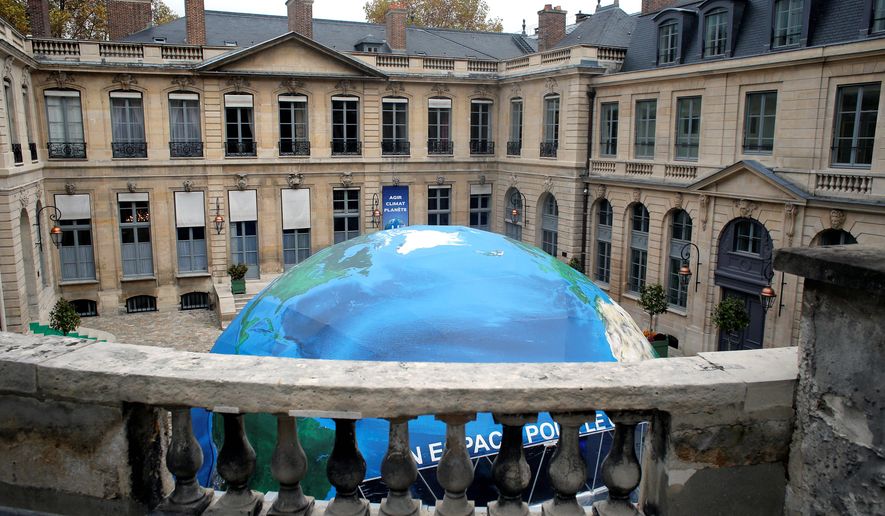President Obama will head to a historic climate change summit in Paris next week with a fragile U.S. commitment to cut greenhouse gas emissions, and analysts say the president is limited in terms of concrete promises and instead will act as little more than a “cheerleader” in the fight against global warming.
The United Nations meeting — formally known as the 21st Conference of Parties, or COP 21 — is by the administration’s own acknowledgment the last true chance for the world to come together and forge a long-term, international agreement to reduce harmful pollution and stem the tide of rising global temperatures. The White House already has promised the rest of the world that the U.S. will cut its own emissions by at least 26 percent by 2025, an announcement made in conjunction with a vow from China, the world’s biggest polluter, to cap its emissions by 2030 and then begin reductions.
Analysts say the administration is wrong to give the impression that it can guarantee U.S. commitments to cut emissions further. Some also say Mr. Obama’s promises ultimately may fall to legal challenges and stiff bipartisan resistance in the U.S.
The key piece of Mr. Obama’s climate agenda is the Clean Power Plan, a set of environmental regulations that forces states to dramatically cut carbon emissions. The plan is wildly unpopular in Congress, and 26 states, along with major utility companies, are challenging the proposal in federal court.
Furthermore, the next administration could simply reverse the entire framework, meaning Mr. Obama’s public promises in Paris may end up being little more than wishful thinking.
“It’s vulnerable, of course, to the leadership of the next administration. As far as I can tell, all of the Republicans [running for president next year] have declared their opposition to the Clean Power Plan, and so that kind of makes it a challenge, rhetorically at least, for the U.S. to commit significantly to the targets it has announced,” said Adele Morris, policy director for the Climate and Energy Economics Project at the Brookings Institution and a climate negotiator during the Clinton administration.
SEE ALSO: Coal communities see bleak future as Obama agenda, natural gas speed industry decline
Ms. Morris said Mr. Obama’s role in Paris is symbolic, at best.
“I think he’s there kind of as a cheerleader for U.S. interests,” she said. “I’m not sure what more the U.S. can promise. It’s not my sense he’s there to break some logjam around the negotiations, but rather to show his interest and support of the issue. To some extent, the president’s hands are tied.”
Broadly speaking, the goal of COP 21 is to secure enough individual commitments from countries to ensure that projected global temperature increases will slow.
White House officials, for example, say the commitments already announced — including those by the U.S. and China — will result in a 2.7 degree temperature increase by the end of this century, compared with a projected increase of well over 4 degrees without the commitments.
Officials and environmental activists say that is not enough. They point to scientific data showing that temperature increases should be kept under 2 degrees to avoid the worst consequences of climate change.
As for Mr. Obama, officials say there is a strategy behind the timing of his visit. He will spend only several days in Paris rather than remaining for the entire two-week summit.
The scheduling appears to be a deliberate attempt to avoid an embarrassing climate summit mishap like the one in Copenhagen in 2009, when Mr. Obama, despite his in-person appeals, was unable to secure a meaningful international agreement to fight global warming.
This time, White House officials say, Mr. Obama will prod other world leaders during one-on-one meetings — including with Chinese President Xi Jinping and Indian Prime Minister Narendra Modi — at the outset and then leave subsequent negotiations to top deputies such as Secretary of State John F. Kerry, Energy Secretary Ernest Moniz and others.
“On the international stage, we knew a new approach would be needed to rally all nations to take action,” Paul Bodnar, senior director for energy and climate change at the White House’s National Security Council, told reporters this week.
Leaders in the U.S. coal industry, which would be decimated by the Clean Power Plan and other pieces of the president’s environmental agenda, are telling anyone who will listen that Mr. Obama’s words in Paris have no real meaning.
“Destroyer Obama cannot commit the United States to anything in Paris beyond his term without the consent of two-thirds of our Senate, which will be impossible to obtain,” Robert Murray, CEO of Murray Energy Corp., the nation’s largest coal-mining company, said in a speech last week.
Indeed, a formal climate change treaty — the only way to truly ensure that the Clean Power Plan and other policies survive after Mr. Obama leaves office — can become reality only if it is ratified by the Senate.
In the current political climate, ratification of a climate treaty is a virtual impossibility.
• Ben Wolfgang can be reached at bwolfgang@washingtontimes.com.




Please read our comment policy before commenting.